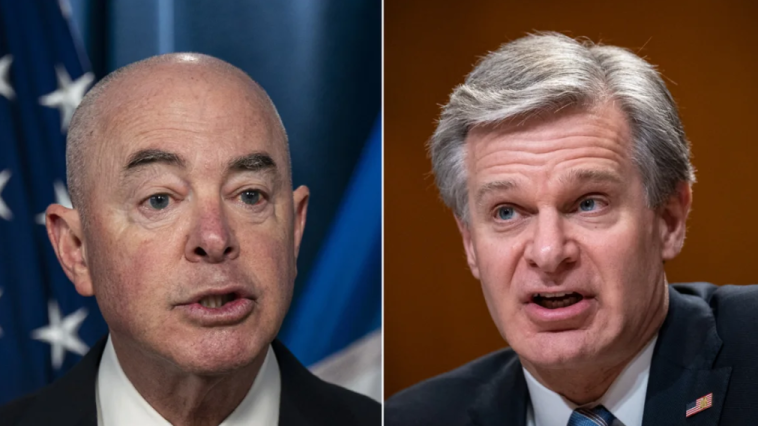Homeland Security Secretary Alejandro Mayorkas and FBI Director Christopher Wray are under fire from lawmakers across the political spectrum for refusing to testify publicly before the Senate Homeland Security Committee’s annual hearing on national security threats. Their decision marks a stark departure from a 15-year tradition of public accountability, drawing criticism from both Democrats and Republicans.
Lawmakers Express Disappointment
Senator Gary Peters (D-MI), the committee’s chairman, criticized the decision, stating, “The American people deserve transparency and accountability, especially on issues as critical as national security.” Peters emphasized that public hearings provide citizens with essential insights into the challenges facing the nation and ensure that leaders are held responsible for their actions and policies.
Senator Josh Hawley (R-MO) went further, calling the refusal “a slap in the face to the American people” and accusing the officials of attempting to evade necessary oversight. “This is an outrageous breach of tradition and a refusal to answer the tough questions that Congress and the public have every right to ask,” Hawley said.
Agencies Defend Their Stance
The Department of Homeland Security (DHS) and the FBI have defended their absence, offering instead to provide information in a classified setting. They cited the sensitive nature of the topics under discussion, including ongoing investigations and counterterrorism strategies, as justification for their decision. Both agencies stressed their commitment to transparency and pointed to prior public statements and briefings on national security issues.
A DHS spokesperson stated, “We remain fully committed to engaging with Congress and providing the information necessary to support oversight, but some matters are best addressed in a secure environment to protect national security.”
Concerns About Transparency
The decision to forgo public testimony has raised broader concerns about the balance between protecting sensitive information and ensuring public accountability. Lawmakers have noted that while classified briefings are important for sharing detailed intelligence, public hearings play a critical role in maintaining trust and providing transparency to the American people.
Critics argue that this move sets a troubling precedent, potentially eroding public confidence in government institutions. “The refusal to appear publicly only deepens the divide between government agencies and the citizens they serve,” said one senior Republican aide. “It raises questions about what they don’t want the public to know.”
Intensifying Scrutiny of Leadership
The criticism of Mayorkas and Wray comes at a time when both leaders are already under scrutiny for their handling of pressing national security issues. Mayorkas has faced ongoing criticism from Republicans for his management of the southern border, with many blaming his policies for record-high illegal crossings. Meanwhile, Wray has been the subject of bipartisan scrutiny for the FBI’s handling of domestic surveillance, political investigations, and counterterrorism efforts.
Their refusal to appear publicly has further intensified calls for greater oversight, with some lawmakers threatening to issue subpoenas if transparency is not prioritized in future hearings.
Broader Implications for National Security Oversight
This controversy highlights a growing tension between the need for classified discussions on sensitive topics and the public’s right to transparency. The annual public hearing on national security threats has long been an opportunity for lawmakers and agency leaders to discuss critical issues in a forum accessible to the public. Skipping the hearing, some argue, deprives Americans of valuable insights into the challenges facing their safety and the steps being taken to address them.
For Mayorkas and Wray, the decision may have long-term implications for their credibility and their agencies’ relationships with Congress. Lawmakers have indicated that they will continue to press for answers, emphasizing that public accountability remains a cornerstone of democracy.
Looking Forward
While both agencies have pledged to work with Congress in classified settings, the backlash underscores the importance of maintaining public trust through transparency. The decision by Mayorkas and Wray has sparked a renewed debate over how to balance the protection of sensitive information with the need for open dialogue between government leaders and the citizens they serve. As this issue unfolds, it will likely remain a focal point in discussions about government accountability and national security oversight.


